Why Oak Hill School?
- Functional academics – Modified curriculum is taught as appropriate to meet the student’s needs. Reading/writing, math, science, and social studies are taught within meaningful, creative activities.
- Common Core – All instruction is based on the Common Core State Standards.
- Daily living skills – Taught in authentic learning settings, including real world environments, as well as community and workplace settings.
- Fine and gross motor development – An adaptive physical education program is available for all students.
- Communication and Assistive Technology – Smartboards, 3d Printers, and classroom computers support learning. We use technology to meet student’s individual communication needs, from switches to iPads and iPods.
- Community participation – Community bases instruction and learning takes place regularly.
- Social skills and Behavior Management – Positive social behaviors are taught and practiced. Behavior specialists and classroom staff provide crisis management and positive behavioral supports.
- Self-advocacy – The ultimate goal for all students is to be as independent as possible. This includes self-help skills and advocacy.
- Art/Music/Yoga – Art therapy, music therapy, and yoga are available for the students.
- Curricular Group – Science club, Technology and Robotics group, and Performing Arts are offered to the students.
- Vocational and Transition programming – Students gain vocational skills and experience in real workplace environments.
- Family Support – We value our collaboration with the LEAs and parents. Communication with parent is frequent, individualized, and valued.
- Collaboration with Chapter 126, an adaptive fitness center, Oak Hill In-Home Services, and NEAT Marketplace which provides adaptive equipment to individuals and schools throughout the state.
- A Trans-disciplinary Approach – Our teachers, OTs, PTs, SLPs, behaviorists, and other professionals work together throughout the day and share their expertise with parents.
“As a trans-disciplinary team, we can better understand what our students are capable of and how to best help them succeed. Then we create meaningful, hands-on activities to teach all skills.”
— Mallory Isbell, teacher
